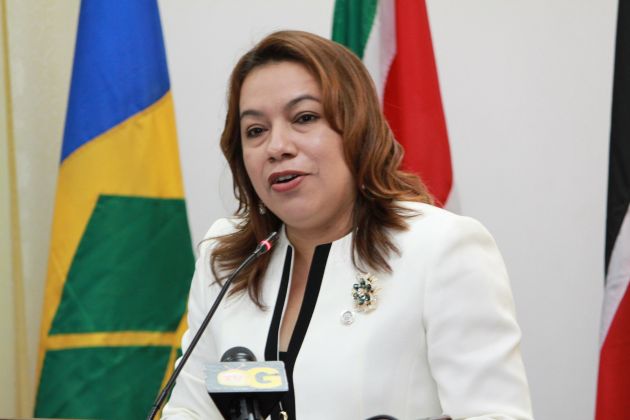In a stern response to Venezuela’s latest attempt to bypass the International Court of Justice (ICJ), Guyana’s Permanent Representative to the United Nations, Ambassador Carolyn Rodrigues-Birkett, defended her country’s position on the longstanding border controversy between the two nations. Speaking at the 78th United Nations General Assembly, Ambassador Rodrigues-Birkett stated that Guyana will not entertain any procedure contradicting the 1966 Geneva Agreement and sidestepping the International Court of Justice (ICJ).
Venezuela’s President, Nicolas Maduro, recently called for a direct dialogue with Guyana’s President, Dr. Mohamed Irfaan Ali, via posts on X (formerly Twitter). This invitation is seen by Guyana as another attempt by Venezuela to disregard international law and the ICJ’s repeated affirmations of its authority to rule on the ongoing case between the two countries.
Ambassador Rodrigues-Birkett stated that the World Court “is the only means of settlement that is now authorised by Article IV of that Agreement.”
She explained that 1966 Geneva Agreement is the binding legal instrument that provides for the settlement of the controversy over the validity of the 1899 Arbitral Award and the land boundary between Guyana and Venezuela. She said the obligatory settlement procedure is set forth in Article IV of the 1966 Geneva Agreement, under which, when bilateral negotiations failed to achieve a settlement, Guyana and Venezuela agreed to refer the controversy to the United Nations Secretary General to choose the means of final settlement.
The Secretary General had chosen, in the first instance, the use of his good offices to bring about a settlement satisfactory to both parties. However, the good offices process took place with the participation of Guyana and Venezuela over a period of more than 20 years, without success or any progress toward success.
The Secretary General later determined that the good offices process had failed and, in accordance with Article IV of the Geneva Agreement, chose a new means of dispute settlement: litigation before the International Court of Justice (ICJ).
Guyana then filed an Application with the Court seeking its final and binding Judgment on the validity of the 1899 Arbitral Award and the boundary between the two States, in accordance with Article IV of the 1966 Geneva Agreement and the Secretary General’s decision. Venezuela twice appeared before the Court to object to its exercise of jurisdiction in the matter, and the Court rejected Venezuela’s objections both times. The Court ruled that the basis of its jurisdiction was precisely Article IV of the Geneva Agreement and the Secretary General’s decision that the controversy should be resolved by the Court.
Guyana’s Ambassador stated, “Accordingly, if Venezuela truly believes that the best, or the only, way to resolve the controversy is by adherence to the 1966 Geneva Agreement, then it should adhere to that Agreement and plead its case to the ICJ, and accept the decision of the Court, when it is issued, as a final and binding settlement of the controversy.”
She also remarked, “The intelligence of the international community should not be insulted by Venezuela’s allegations that Guyana is allowing its territory to be used as a platform for military aggression against any State including the Bolivarian Republic of Venezuela.”
The recent rattlings by Venezuela, came about after Guyana’s inaugural offshore licensing round, attracting attention from international oil companies, was closed.
Venezuela is now asserting that it shares a brotherhood with Guyana, in its appeal for talks, despite saying that there is “illegitimate exploitation” of the Essequibo region, and that it will apply “all necessary measures” against investing companies.
Further stoking the fire, the Venezuelan National Assembly unanimously passed a motion reiterating its claim to Guyana’s Essequibo region. This move stands in stark opposition to longstanding efforts to maintain Latin America and the Caribbean as “Zones of Peace.”
While tension mounts, the international community, including the Caribbean Community (CARICOM), United States, the Organisation of American States (OAS), and the Commonwealth of Nations, stands firmly behind Guyana. Their collective hope is that both countries will constructively engage with the ICJ’s proceedings to arrive at a peaceful and law-based resolution.



